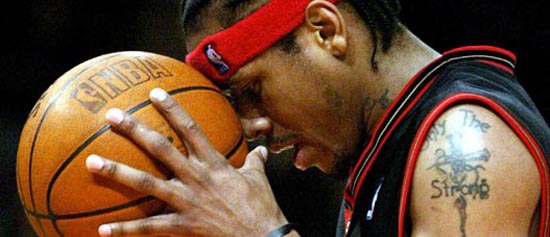

Allen Iverson has to be one of the most fascinating players in the history of the NBA, and he’s definitely one of my personal favorites. What did AI bring to the game of basketball other than cornrows, tattoos-galore, and baggy shorts? A lot. Not only was Iverson’s unique hip-hop swagger new to the NBA in the late nineties, (or, rather, the post-Jordan era) his style of play was also a novel concept. For the most part, if you you’re a player under 6 foot 3, you’re expected to play the point guard position, which comes with ample expectations that didn’t exactly align with Iverson’s DNA. Point guards are to be unselfish distributors—having an ingrained “pass-first” psyche on the court. Historically, this has been what shorter players do, but not AI. Iverson was a natural scorer—and even at his size, it felt as if he had the opposing team in the palm of his tattooed hands. In his outstanding book, Nathaniel Friedman describes Iverson’s provocative arrival in the NBA:
But what really made Iverson disruptive was his game. AI was the ultimate one-on-one player and an unrepentant ball hog. And that was that. In this acid rejection of so much received basketball wisdom, AI proved instantly provocative. A lightning quick, relentlessly inventive, utterly fearless scorer, Iverson was unguardable without abundant help. Iverson’s crossover was often pointless and theatrical, but that didn’t seem to matter when it came to freezing defenders.
These characteristics, which made Iverson so intriguing and fun to watch, were also the very characteristics that flew in the face of traditional point guard play. Instead of having a “pass-first” mind-set, AI had a “shoot-first and shoot fast” mentality—and boy did he shoot it! After an awkward season as the Sixers starting point guard, he was moved permanently to the shooting guard position his second year, which was the best possible move Sixers head coach Larry Brown could’ve made.
Iverson dominated the league—winning four scoring titles and was awarded the league M.V.P. AI was, as the saying goes, a bad man. The things AI did on the court were simply incredible.
No doubt, the little guy was a genius on the court, but he brought lot of heartache to the Sixers, and to Coach Brown. To be honest, I would not have wanted Larry Brown’s job—Iverson’s infamous “Practice” press conference speech alone is every coach’s worst nightmare (pure gold, see video at end of post!). It’s safe to say that coaching someone who publicly mocks the idea of practice being important would be undeniably tough—especially when the mocker is your best player.
Brown and Iverson’s player-coach relationship was often on shaky ground—reports about their struggles didn’t surprise anyone, whether it was Brown benching Iverson, or Iverson cussing Brown out for doing so. Oftentimes, the two interacted more like that a father coaching his 10-year-old son than grown, professional men. To be clear, as shaky as their relationship seemed to be, it was also strikingly moving, a fact that has come to the surface more explicitly since Iverson has been out of the NBA. Both Iverson and Brown have opened up in greater detail about their relationship in Philly, which is, at the same time, really fascinating and actually encouraging.
In a quick interview with csnphilly.com, Iverson was asked about his time playing under Brown. AI’s response is quite telling.
You know I used to think [in those days] that he was criticizing me for the things he was telling me, but he was teaching me.
Iverson’s words remind me of a particular scene in The Lord of the Rings: The Fellowship of the Ring, which was a part of one of R-J Heijmen’s talks at the Mockingbird Fall Conference (listen!). You know the scene. When Frodo, afraid to hand his beloved ring off to Galdalph, evokes this potent statement from the wise wizard: “I am not trying to rob you. I’m trying to help you.”
Here’s Brown’s particularly thoughtful response after being asked about Iverson in an interview with NBA TV in April.
He played 48 minutes every game, he tried to win every possession, he played hurt. Nobody at his size could’ve accomplished what he’s done. There’s some way, some how he’s got to get on some NBA team, where’s he’s introduced as a starter in every arena, where people can give him the respect he deserves.
I can think of multiple coaches in the NBA that wouldn’t have put up with Iverson. Brown’s words are worth their weight in gold. This is not the first account where Brown and Iverson have mentioned their unique bond. Iverson, perhaps, has more of a reputation as an outcast now than he did in 2000. AI is currently unemployed and is facing severe financial struggles. No one seems to want Iverson on their team, so Brown’s words are timely.
Brown met Iverson where he was. I can’t help but think of Brennan Manning’s anthem, “God loves you unconditionally, as you are and not as you should be.”
I miss AI, especially when I watch this video.
[youtube=http://www.youtube.com/watch?v=d29VsG35DQM&w=600]

COMMENTS
2 responses to ““We’re Talkin’ About Practice?”—Coach Brown as Helper Not Robber”
Leave a Reply













Great stuff, thanks. The “Practice” rant still makes me laugh out loud. But AI played really hard all the time in the games
I’ve watched it at least 10 times in the past few days…it never gets old!